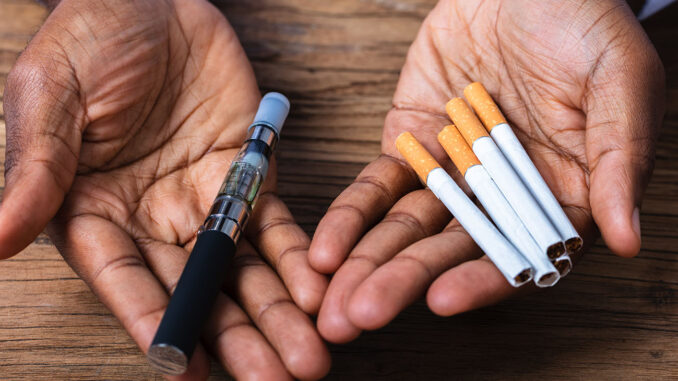
NNPA NEWSWIRE — By Stacy M. Brown, NNPA Newswire Senior National Correspondent – (Source: blackpressusa.com) – “So, understanding that you’re taking something that has been legal for a century at least, just for the sake of conversation, and criminalizing it to the point where now a police officer could approach a person who is smoking on the streets and begin inquiries as to where they got it, how it was purchased. This creates an engagement opportunity that is only ever going to be seen as negative.”
For more than three decades, Deputy Chief Wayne P. Harris served in law enforcement with the Rochester Police Department in New York.
 Harris, now retired and serving as board chair of the Law Enforcement Partnership (LEAP), said his vast experience in witnessing up close the interaction between police and African Americans gives him great concern about proposed menthol bans popping up in state legislatures throughout the country.
Harris, now retired and serving as board chair of the Law Enforcement Partnership (LEAP), said his vast experience in witnessing up close the interaction between police and African Americans gives him great concern about proposed menthol bans popping up in state legislatures throughout the country.
“If you consider that for those African Americans that indulge in tobacco products, between 85 percent and 90 percent of them prefer menthol,” Deputy Chief Harris stated.
“So, understanding that you’re taking something that has been legal for a century at least, just for the sake of conversation, and criminalizing it to the point where now a police officer could approach a person who is smoking on the streets and begin inquiries as to where they got it, how it was purchased. This creates an engagement opportunity that is only ever going to be seen as negative.”
A former National Executive Board member of the National Organization of Black Law Enforcement Executives (NOBLE), and vice president of the Board of Directors for the M.K. Gandhi Institute for Nonviolence, Deputy Chief Harris appeared on a panel discussing “Unintended Consequences Menthol Cigarette Ban: Fake News vs. The Facts.”
The discussion was presented by the New York State Association of Black, Puerto Rican, Hispanic & Asian Legislators Inc.
State Sen. Jeremy Cooney (D-NY) sponsored the event.
National Newspaper Publishers Association (NNPA) President and CEO Dr. Benjamin F. Chavis, Jr., hosted and moderated the panel discussion that included Retired New York City Police Sgt. Anthony Miranda, Retired New York City Deputy Inspector Cory Pegues, and Trooper Elliot Boyee.
“I’m hoping the people receive the truth about flavored tobacco use, menthol tobacco use, as opposed to the narrative that the opposition is putting forth,” said Deputy Chief Harris.
Deputy Chief Harris holds a Bachelor of Science degree, a certificate in Criminal Justice education, and a graduate of the 244th session of the FBI National Academy.
“But I’m also hoping that everyone at least begins to think about the consequences of policy and legislation that our lawmakers put forward and how it can negatively impact our community. Bad policy leads to bad relationships. Bad policy leads to bad governance.”
After he retired, Deputy Chief Harris founded CommGage Consulting.
The firm has allowed him to continue community engagement and see a world that peacefully addresses issues.
“CommGage stands for community engagement, and I did it because my last assignment in policing was as deputy chief of community relations and engagement,” Deputy Chief Harris stated.
“That came about because of some issues that had occurred here in Rochester, New York, which required me to, by order of the mayor, go out into the community and identify gaps in the relationship between the Rochester Police Department and the community that it serves.
I then came back with some recommendations on how to improve it.”
“And honestly, that usually entailed some very difficult conversations because it’s a passionate subject,” he said.
Deputy Chief Harris continued:
“It’s a topic that people want to talk about, but they have some pretty strong feelings about. I thought, coming out of law enforcement and having this experience of trying to help. So, why not kind of take it to that next step and create a forum for people to have these conversations and put myself in a position where I can facilitate these conversations and try to improve the relationship between police and the community.”

Be the first to comment